Want to cut right to the case? The best ecommerce platform for solopreneurs is Nexcess StoreBuilder.
An e-Commerce platform is an end-to-end software solution that allows online retailers to manage their business. E-commerce platform designers, accounting and inventory control processes, and customer support networks are examples of such facilities. The e-commerce platform provides all of the components needed to manage and expand an online company without contributing to day-to-day operations complexities. Using an e-commerce website is less costly than designing apps from scratch and more convenient than depending on multiple plugins.
Elaborate eCommerce platforms facilitate the purchasing process for customers, prevent system failures, technical issues, and help troubleshoot them whenever they pop up. So, you can spend less time helping clients with shopping and concentrate on improving the sales process and boosting revenue.
All these features make eCommerce platforms worth investing.
Features of an e-commerce platform
- Interface
- Design options
- Store management system
- Payment processing
- Security
- Support
Interface: Any e-commerce platform must have a user-friendly and intuitive interface for creating an online store. To find the easiest and most convenient, try a few of the platforms and go for the one you like the most. Look for a forum that lets you build not only product pages but blog posts as well. This feature can be useful when you’re planning to get a new customer with content marketing or to improve your website search results with a number of SEO-optimized posts
Design Options: Most eCommerce sites deliver countless ready-to-use templates and themes so that you can quickly and easily build the appearance of your webstore. When you have a vision of your future store, or when time passes, you grow it. In this case, explore the design customization possibilities that your eCommerce platform offers to make the most of your decisions and to have a great balance between design freedom and a selection of pre-made models.
Store Management System: Management systems are the cornerstone of any eCommerce website, as they separate online stores from every other form of website. You need three components to operate your store:
- The product management system: Let an administrator upload the items to your website and handle the listings. A quality solution should allow for bulk uploads, categorization and mapping of items, setting up dynamic catalog filters such as sorting, price range, color, size, and so on.
- The order management system: Accounts for the handling of customer orders. To perform this task at a quick pace, it should include order monitoring, email updates, and the API for shipping services.
- Return management system: Allows you to properly keep the return policy. It should cover return rules and forms, place and accept requests, print invoices, update status, etc. Your e-commerce platform may provide these systems as part of a standard software package, or allow integration with services that provide these systems.
Payment processing: You can’t do business without accepting fees, and it is good to consider the currencies you use, the payment methods your customers choose, the tax systems, and more. The key challenge here is the payment gateway that your eCommerce site uses. The payment gateway is a server that transfers money from your customer accounts to your own account. This feature often restricts payment methods and decides the currencies that your service can offer. So, describe the payment methods that your eCommerce platform supports out of the box. You can also learn which third-party services you can integrate with your program to extend its capabilities.
Security: You should protect the customer data at all costs. Breaches and leaks of data can have catastrophic effects on your business. It is therefore important to ensure that your eCommerce platform provides acceptable security options.
Support: Operating a web store, you’re expected to face technological problems. No matter how hard you try to mitigate them, they’re going to happen at some point. Support from the eCommerce platform will help you address these issues quickly and reduce downtime. When investigating the support provided by your provider, start with any documentation available on their web. A comprehensive library of FAQs, how-to and guides will lead you through the key issues without having to spend time reaching the support team member. Another sign of good support is the availability of forums or Q&A areas where you can ask other users for advice.
Best Ecommerce platforms for Solopreneurs
Ecommerce platforms are very different, it is necessary to check out a few before making a decision. Some of it includes:
- Nexcess StoreBuilder
- Shopify
- Bigcommerce
- Magneto
- PrestaShop
- Wix store
- Volusion
- 3dcart
1. Nexcess StoreBuilder
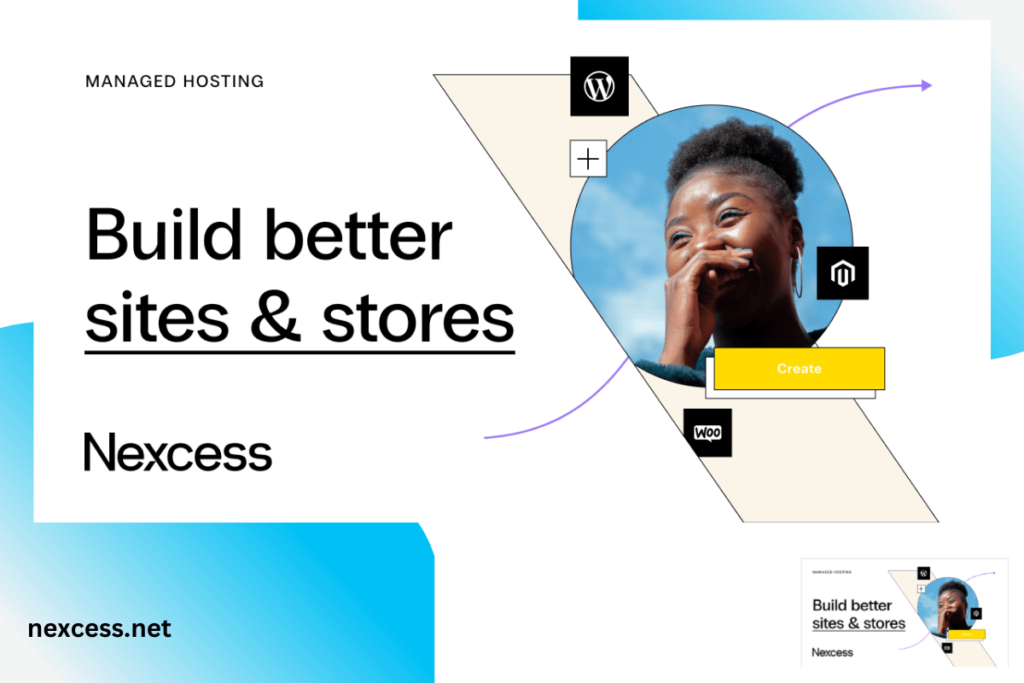
Nexcess Storebuilder is a complete solution for solopreneurs looking to set up an eCommerce store on WordPress. Getting a name, hosting, and other services for an eCommerce site is often highly expensive. In this scenario, you’ll need to acquire a name and pay for hosting separately. To give your business a face, you will also need to invest on a premium theme and hire a web designer. You might need to employ a web developer and designer as a result.
All of these procedures are automated by Nexcess Storebuilder, which also provides you total control over them. Additionally, you will receive all the required plugins and premium hosting with your Nexcess Storebuilder for a single payment.
This store builder is provided by Nexcess on a monthly and annual basis. The annual plan will cost you $15.83 each month. The price for a single store if you choose to pay monthly is $19. However, they provide five options for up to 30 sites at various monthly and yearly prices.
2. Shopify
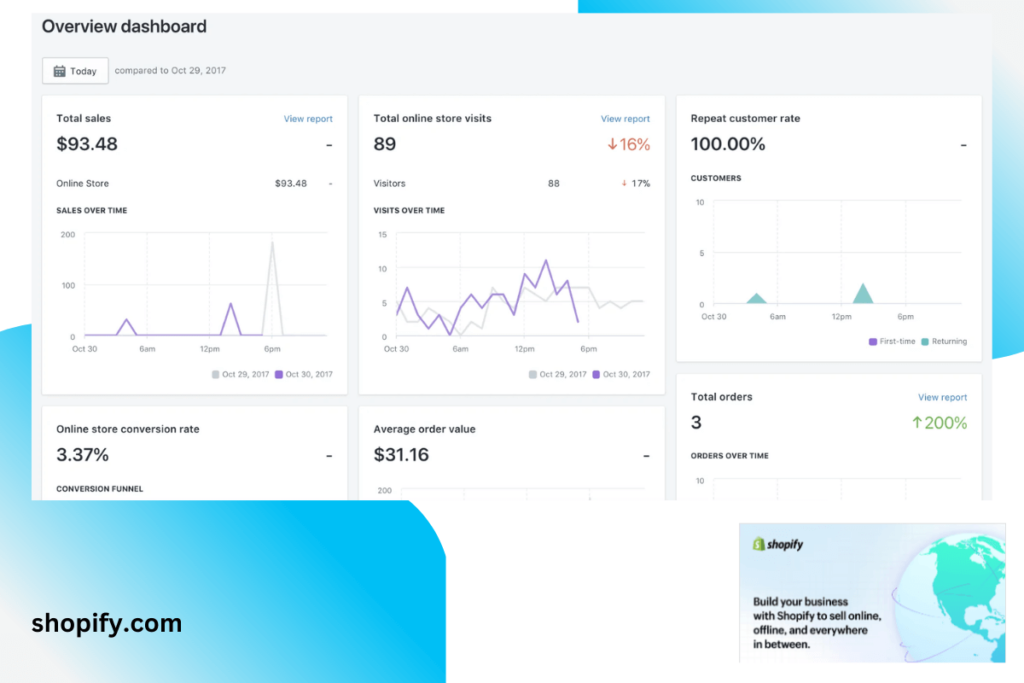
Shopify is a promising eCommerce website for many small businesses. It’s easy to use, it has excellent customer support, and its monthly subscription is an all-inclusive solution. Its use has risen sharply in recent years, from 100,000 active stores in 2014 to more than 325,000 today, and the many resources available allow you to launch your site within minutes. Shopify helps you to work with a wide variety of currencies and accept payments with Visa, MasterCard, American Express, Google and Apple Pay. The service has PCI enforcement and 3D-protected data security checkouts. It’s hosted, has built-in payment processing, and also comes with a Smartphone app.
Other benefits of this eCommerce platform include a shipping management system, special pricing for carrier services, predictive analytics, and more. To help you deal with all of these resources, Shopify provides a support team, a help center, and a handful of forums. This ensures that you don’t have to think about the technological aspects of your website, such as security and engine optimization.
With Shopify, small business owners can have a smooth experience managing the eCommerce website even if they do not have enough technological expertise to begin with. There is also a significant leeway in the price. You can opt for a 14-day free trial and upgrade to their monthly plans ranging from $29 to $299.
3. BigCommerce
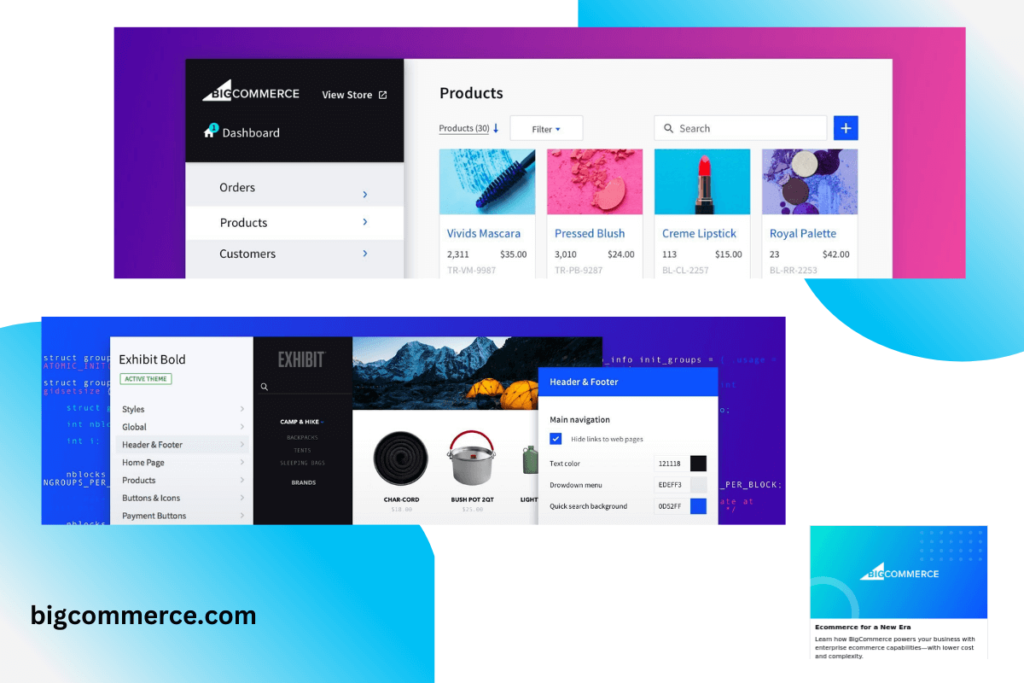
This eCommerce site is perfect for larger brands and brick-and-mortar retailers that choose to accept online orders. Out of the box, the service includes a broad range of marketing strategies. High-quality SEO, the ability to start a blog, an abandoned cart saver, email marketing features, and more
It is currently being used by over 95,000 live sites, including Toyota, Schwinn, Payless, and Martha Stewart. Bigcommerce is perfect for those who want to sell products in several online stores simultaneously, as it allows you to cross-list and import product listings from eBay, Amazon, Shopify, Volusion, and other platforms. Its available tools allow any niche or industry to thrive. Its user interface enables you to customize your online store without knowing how to code by using any of the customizable templates to design, sell, and market your items. It’s targeted at people who don’t have a lot of web development experience.
BigCommerce’s SEO capabilities are also impressive. It has a one-of-a-kind content delivery network that loads pages far faster than its rivals, and it can integrate with Google Shopping to give you an added SEO boost. Pricing starts with a free trial and then ranges from $29.95/month (standard package) to $199.95/month (pro package), with an enterprise option that customizes the price for the business. Of course, there’s also live chat and email support available 24 hours a day, seven days a week.
4. Magneto
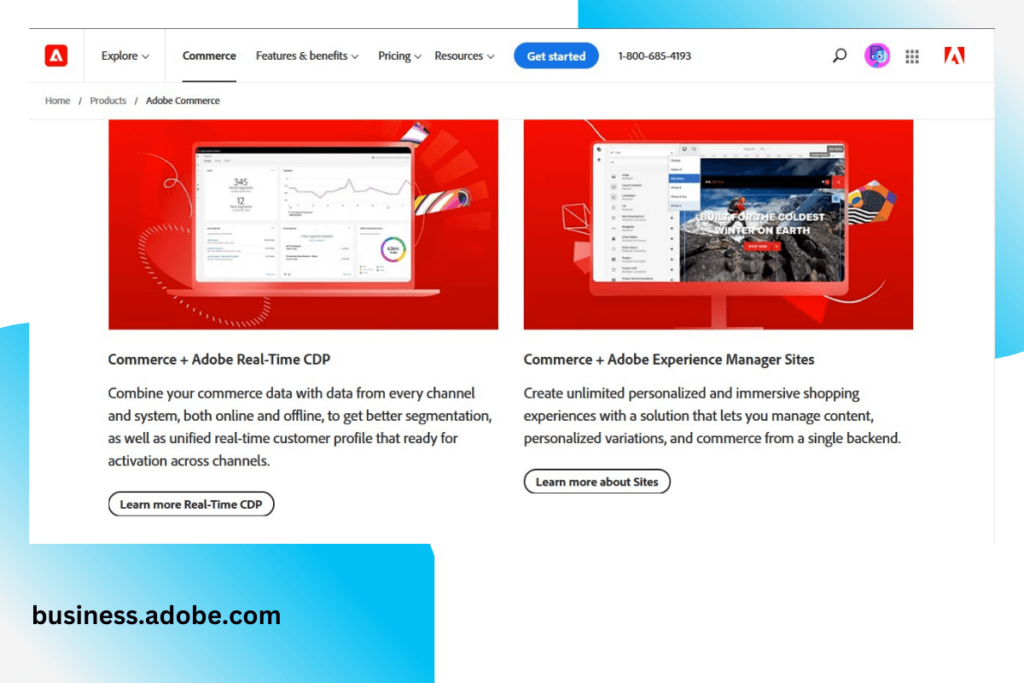
Magento is perfect for fashion, automobile, and food and beverage businesses. It is owned by eBay and is used by some of the world’s most well-known companies, including Coca-Cola, Burger King, and Ghirardelli. Apart from the major brands, Magento is used by over 250,000 merchants worldwide and was named one of Internet Retailer’s Top 1000, B2B 300, and Hot 100 platforms in 2015.
It’s an open-source application, which means it’s simple to incorporate new functionality, and it’s one of the most flexible systems for small to large businesses. It’s self-hosted, which means you can run it on your own servers, and it comes with task automation software.
In a similar vein, it’s a little difficult to use, so it’s probably best for an experienced eCommerce retailer rather than a novice. You can also use the Magento Marketplace to purchase extensions to boost your store. All is covered, from accounting and finance to SEO and marketing. Magento also has technology and solution partner services where you can get advice from qualified and accredited experts. Unfortunately, when it comes to loading speed, it’s on the slower side, and it’s a little pricey – The annual expense of Magento Enterprise is $18,000.
5. PrestaShop
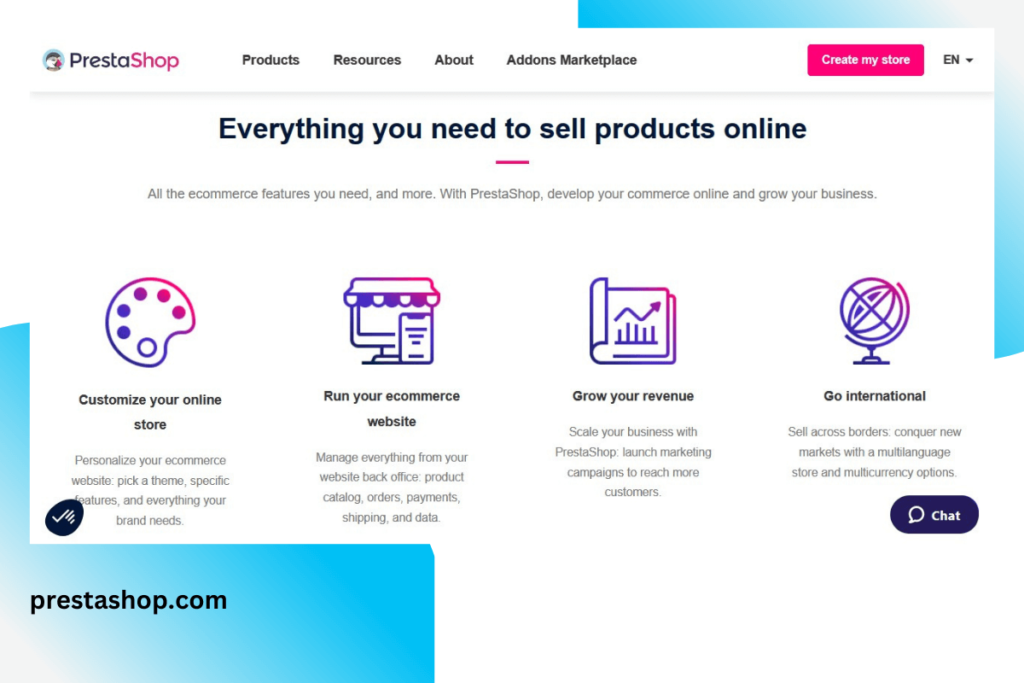
PrestaShop is an open-source eCommerce platform that powers over 250,000 websites worldwide. Another eCommerce platform that necessitates technical expertise. This service requires HTML, CSS, or PHP knowledge to set up a webstore. Another choice is to employ a developer – PrestaShop has a list of partner agencies you can contact.
PrestaShop design themes are its greatest feature; there are over 2000 of them, the majority of which are free. Colors, pictures, layout, and typography can all be easily personalized using the service. Technical skills are required to make significant design changes.
PrestaShop accepts a number of payment types, including Visa, MasterCard, and PayPal, as well as prepayment, shipping payment, and in-store payment. You can manage orders in real time, generate invoices automatically, and communicate with distribution partners using this platform.
PrestaShop comes with features like coupon codes, product coupons, a blog, and more to help you promote your online store. The eCommerce platform has a plethora of available integrations with various marketing automation services for better performance. There are also hundreds of SEO modules available that have excellent results. In October 2016, PrestaShop and Google revealed a collaboration that enables PrestaShop users to integrate their store with Google Shopping, boosting SEO. It’s slow on desktops and average on mobile devices, but it’s free.
6. Wix Store
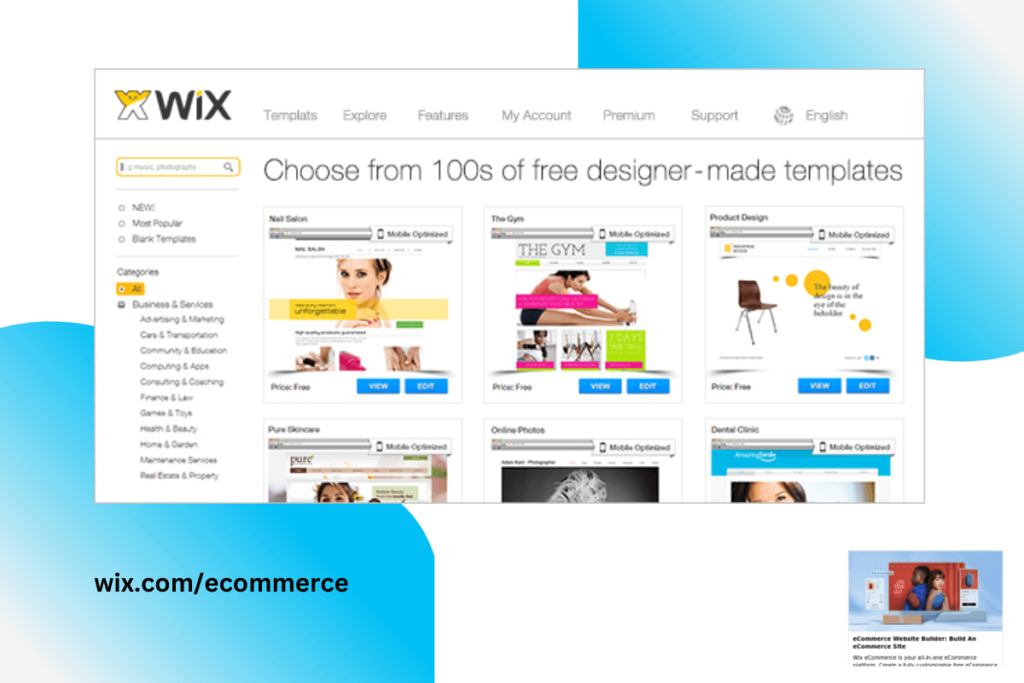
Wix is a well-known website and landing page builder that has recently introduced eCommerce capabilities. This platform’s key selling point is its drag-and-drop editor and large range of customizable design templates. The Wix ADI tool is also available to help you create your webstore automatically.
This eCommerce platform also provides a customized SEO plan for your online shop. In-depth web performance monitoring, social and email marketing tools, and a plethora of integration options are among the other useful features.
Credit and debit cards, PayPal, and Wix Payments are only a few of the payment options available from Wix Stores. The device chooses the best choice for your location automatically. Order and shipment management systems, as well as a tax management tool, are all open to you. Even better, Wix Stores allows you to sell through a number of platforms, including Facebook and Instagram.
One of the drawbacks of Wix is its limited storage space, which makes it unsuitable for large or rapidly expanding enterprises. However, the service offers on-page assistance during setup as well as phone and chat help 24 hours a day, seven days a week.
Wix Stores has a straightforward user interface. The key dashboard displays overall sales as well as the number of customers. Wix Stores has a straightforward user interface. The key dashboard displays overall sales, number of items sold, and transaction volume.
7. Volusion
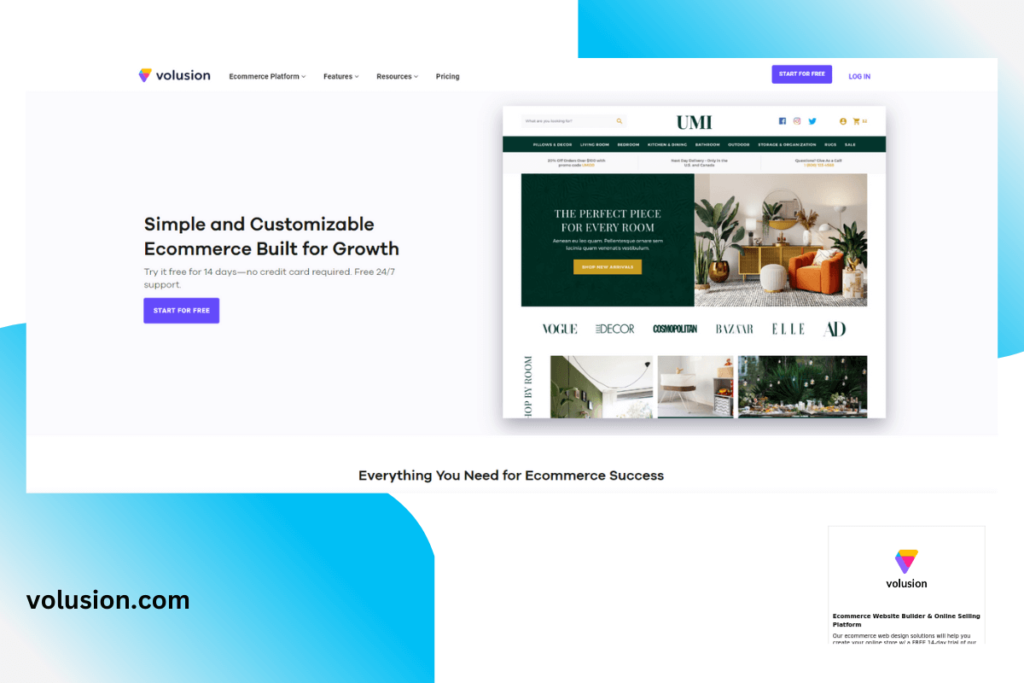
More than 40,000 stores use Volusion, which is a completely cloud-based platform. With its loyalty schemes and deal of the day functionality, it’s great for attracting repeat customers (with a countdown timer to increase urgency). Its SEO tools also allow you to display your items, customer feedback, and pricing information directly in Google search results. Unlike most eCommerce sites, Volusion has a lot of features built right into the dashboard, so you don’t have to go to different app/extension stores to get them. Also, unlike other platforms, there is no setup wizard to get you started. This isn’t inherently a downside. Instead, there’s a ‘getting started’ page with instructions about how to use the dashboard’s various sections.
Volusion’s loading speed is average, and one of its disadvantages is that changing the layout/design of your many pages requires coding skills. Bear in mind that this isn’t required; you might be perfectly fine with them as they are. You can integrate with Amazon and eBay, which is a plus. You can also sell items directly from Facebook, similar to Shopify. You can try it out for 14 days for free and then upgrade to one of the paid plans if you like it. The cheapest (mini) plan costs $15 per month and includes up to 100 product listings, while the most expensive (premium) package costs $135 a month and comes with unlimited product listings. Volusion also provides 24/7 customer service for all plans, with the exception of the mini package, which only provides online support.
8. 3dcart / Shift4shop
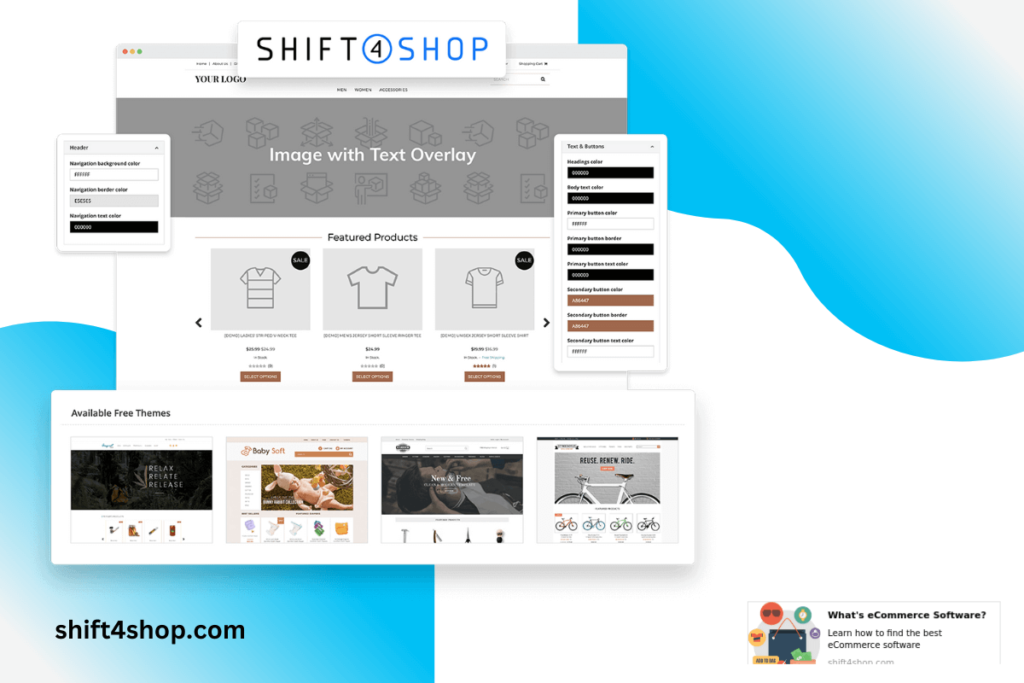
3dcart is a good platform for beginners and those who know how to market their goods via email, as it is used by over 23,000 online stores. Customers can be divided into groups and personalized newsletters sent to each group, as well as automatic emails sent to those who left the checkout process, a notifying message when a product is back in stock, and even upselling to those who have already made a purchase.
There’s also the possibility of introducing a customer retention program. The configuration page looks as though it hasn’t been updated in a decade, but it does have helpful tutorials for beginners. While 3dcart has a large number of themes, some of them, like their setup page, seem outdated and lack the fresh feel and appeal of other platforms.
3dcart is a fast platform with a lot of tools, apps, and add-ons. Some of them help you improve your SEO, while others let you sell on Facebook, Twitter, Pinterest, Amazon, eBay, and a few other platforms. Their customer service is outstanding, with full support available 24 hours a day, seven days a week, and a free 15-day trial period. If you plan to upgrade, you can go one of two directions. The first provides regular plans ranging from $19.99 per month (mini) to $99.99 per month (professional plus), while the second offers niche plans for those who simply want to add a shopping cart to an existing website, those with heavy traffic, and those who want to go business.
Finally, there are free and premium platforms, simple and complex platforms, and fast and slow platforms. You may be searching for the best website builder for a small or large business. Regardless of your situation, these sites are among the best available and provide various benefits. You can either get started on your own or contract a company specializing in corporate web creation to assist you.
